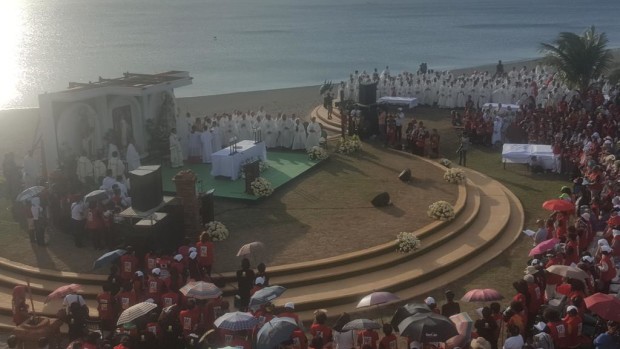‘God’s mercy shown in valuing life, not in killing, trolling’

Bishop Ruperto Santos celebrates the last mass for the World Apostolic Congress on Divine Mercy (Wacom) in Bataan. JULIE M. AURELIO/PHILIPPINE DAILY INQUIRER
BAGAC, Bataan—The mercy of God is about life—sustaining and prolonging it, not taking it.
Balanga bishop Ruperto Santos gave this reminder at the closing of the World Apostolic Congress on Divine Mercy (Wacom), which gathered almost 6,000 Divine Mercy devotees from all over the world.
In his homily at the last Mass for the Wacom 4 here at the Las Casas Filipinas de Acuzar on Friday afternoon, the prelate urged Filipinos to be messengers of God’s mercy.
One of the common denominators of mercy, he stressed, was the value of life.
“(Mercy) is to sustain life, not to make it suffer. It is to prolong life, not to suppress it. It is to maintain life, not to murder it,” Santos said.
Article continues after this advertisementHe added: “Remember the seventh commandment, ‘thou shall not kill.’”
Article continues after this advertisementREAD: Traslacion message: Stop the killings
The Wacom is held every three years and is aimed at furthering the devotion to Jesus as the Divine Mercy within the Catholic Church.
Santos pointed out that Filipinos are now tasked to be the new missionaries and messengers of God’s mercy to humanity, spreading it through good works and corporal acts of mercy.
“Our mercy is not to take matters into our hands. Our mercy is not to cast the first stone. It is our mercy to open our hands, hold them tight and help them live with dignity and without recriminations,” he said.
READ: Foreign delegates concerned over EJKs
Filipinos, he said, are now “new missionaries of mercy, from the Philippines to Asia, from Asia to Europe.”
In his homily, the Balanga bishop cited the day’s Gospel about the woman who was brought to Jesus, not to be saved, but to be punished with stoning to death.
He noted that the crowd did not have any sympathy, pity or mercy for the woman, as they demanded death for her.
Santos asked how one could rejoice with the death penalty, and how could one take pride in killing in the name of God or religious beliefs.
“How can we not be ashamed of our corruption and destruction of environment for money and profit? How can one be glad with the spilling of innocent blood, of destruction of lives because of human trafficking?” he said.
The prelate reminded the faithful that even those with a shameful or scandalous past still has hope of redeeming and living a new life.
“Even if he is the worst sinner he can still be sorry and correct his life. There is hope. There is still help. And there is still healing. It is because our God, is a God of mercy,” he said.
Santos pointed out that one’s merciful words should be polite and not offensive, encouraging and not hurting.
“Fake news and trolls are not mercy. They are lies. Bullying and internet bashing are not mercy. They are offensive and violent. Verbal abuse and gossiping are not mercy. They are character assassinations,” he added.